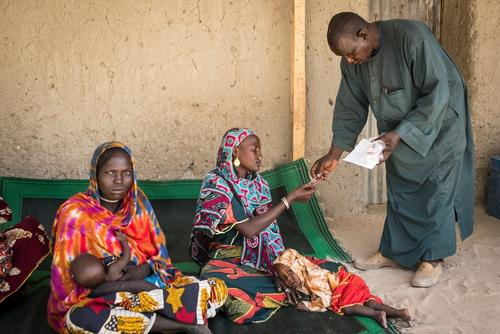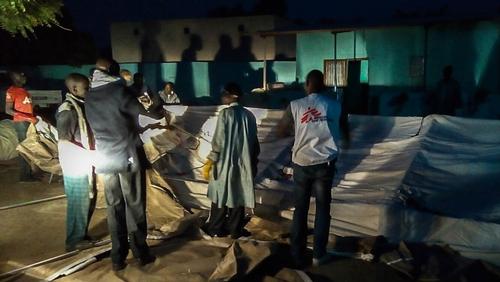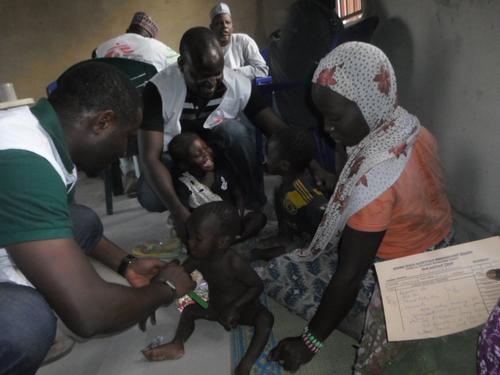The already fragile condition of the population in Diffa has recently been aggravated by the escalation of the on-going armed conflict in southern Niger. The area bordering north Nigeria is facing new waves of displaced people and refugees escaping the violence raging around Lake Chad, especially since last February when the conflict spread to Niger. Living conditions are critical, with the displaced population having little access to healthcare and safe water.
The vast majority of people seeking refuge in Diffa are settled in spontaneous settlements or with host families. However, the increasing number of displaced people and is causing the initial solidarity displayed by the already precarious host communities to falter. Around 17,000 people are currently established in two spontaneous displaced camps, in Bosso and Nguigmi districts, after the evacuation of Lake Chad in late April. There are very few humanitarian actors working in the area.
“Many of the people we are assisting have had traumatic experiences which have forced them to leave their homes,” explains Elmounzer Ag Jiddou, MSF head of mission in Niger. “However, in Diffa they are going through a very difficult situation as their basic needs are not covered. Moreover, they are also afraid of being attacked again.”
The rainy season and the hunger gap are just around the corner
In the coming weeks, Diffa will face the usual hunger gap when the number of children affected by severe acute malnutrition increases. The situation this year is especially critical because the violence is affecting normal trade in the area and many fields have not been planted.
Furthermore, the imminent arrival of the rainy season will bring with it a growing number of malaria cases which, in combination with increased malnutrition, makes for a particularly lethal cocktail, especially in young children. Also, the combination of heavy rainfall and the already poor sanitation conditions in the displacement camps has the potential to further deteriorate the health situation of a population already weakened by the ongoing crisis in the Lake Chad basin area, where cholera is endemic.
“The rains also make access more difficult, further hindering the arrival of humanitarian aid,” says Luis Encinas, MSF’s programme manager for Niger. “Right now, there are very few organisations in the area despite the great needs, and we are very concerned that the situation may further deteriorate in the coming months. In response, we have started to diversify activities, building latrines and supplying water as these aspects have become priorities and are still not getting the level of response they should be.”
MSF increases its operations in Diffa to address the growing needs of the population
To improve healthcare for the local and displaced population, MSF is working alongside the Ministry of Health in the main maternal and paediatric health centre in the city of Diffa, and in six health centres in the districts of Diffa, Nguigmi and Bosso. To address the increase in malaria cases in the coming months, MSF will start distributing 25,000 insecticide-impregnated mosquito nets throughout the region.
The organisation is also working with mobile clinics in both camps in Nguigmi and Bosso, where its teams have attended to more than 2,500 people, providing them with medical care during the month of June. In the Yebi camp in Bosso, MSF is also carrying out water and sanitation activities to guarantee that each person has access to 20 litres per day, the minimum quantity recommended in an emergency situation.
MSF started working in Diffa in December 2014 in response to a cholera outbreak, and treated a total of 271 patients. From January 2015, the organisation started supporting the health centres of Ngarwa and Gueskerou (in Diffa district) and Nguigmi (in Nguigmi district). After the Boko Haram attack in Diffa on 6 February, MSF scaled up its operations supporting the main maternal and paediatric health centre in Diffa town. At the beginning of May, MSF again increased its activities to assist the displaced population who had left Lake Chad and were living in harsh conditions in camps for displaced people.
Since the beginning of July, MSF has been supporting three additional health centres in Baroua, Toumour (in Bosso district) and Ngalewa (in Nguigmi district).
MSF has carried out more than 15,000 medical consultations, since the beginning of its intervention in Diffa, including more than 12,000 for children under 5 years old; and more than 450 patients have been admitted to the maternal and paediatric health centre in Diffa.
There are currently 122 MSF staff working in the country; 111 national staff and 11 international staff.





